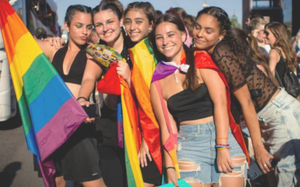lgbtq+
Study: Pride Backlash Is Exaggerated
- by Danielle Oster , June 20, 2025

Back in April, Collage Group released a study entitled “Beyond Pride,” which included findings that 53% of LGBTQ+ consumers believe it’s more important for brands to engage with cultural events such as Pride than it was two years ago, and 45% would stop supporting brands who pulled back from such engagement.
We caught up with Collage Group Director of Cultural Insights Katya Skogen to discuss more takeaways from the study.
This interview has been edited for length and clarity.
Marketing Daily: Were there any particularly noteworthy or surprising findings in the study?
Katya Skogen: Some people may not know that the LGBTQ+ segment has higher interest than average in heritage months in general, and tend to overindex in participation and engagement with such events. It’s not surprising to those who know the segment because of the known activist values many in the community hold of standing up for other groups that may be underrepresented. It’s a very culturally rich segment.
advertisement
advertisement
That means there are rich opportunities to engage throughout the year that should be promising, and it raises the bar a bit for brands and marketers.
Smart brands have a full calendar of engagement throughout the year. We present some of the milestones that could be helpful, such as Halloween, and “friendsgiving” around Thanksgiving.
Marketing Daily: Can you speak to what is driving some of the changes brands have made in recent years with Pride, and LGBTQ+ marketing more generally?
Skogen: We are seeing a loud but vocal minority speaking out in very negative but aggressive terms against the LBGTQ+ community, and specifically transgender and nonbinary individuals. Because attitudes do differ across those different groups—with people less likely to have positive attitudes about trans and nonbinary people
That’s coming from anti-trans political discourse, which spills over to social discussions. With the second Trump administration, we’re seeing more swift, openly anti-LGBTQ+ and anti-DEI actions that are starting to affect brands and marketers more and more. Those actions include executive orders and other measures around gender-affirming care, and trans people’s access to sports at different levels.
Because of this alignment and some of the actual actions the administration has taken against companies—like certain media companies, for instance—more brands are staying silent. What used to be more of a conversation around company values or their social marketing hits a lot closer to their business operations, or even veers toward legal compliance territory, especially with companies that have some dependence on federal funding, or are concerned about either retaliatory action from the Trump administration, or fear being seen as not complying with government mandates. Often, the decisions made at the higher levels are made without marketers’ input or control. That is the overall challenge of navigating these times.
Marketing Daily: What do brands lose by not engaging with LGBTQ+ consumers?
Skogen: Gen Z are more likely to identify as LGBQ+. Even among those who don’t identify as LGBTQ+, they innately value diversity, a difference of life experiences, and fluidity of identity. This is showing where we are headed as a society. For brands trying to sell to these consumers in the future, this is a priority you cannot leave behind.
When you tell a story that gets to the human heart of what it’s like to belong, to be seen, to be yourself and not be judged, it really connects with so many people out there. Smart brands that have been doing this for a while that engage with this and other communities at a deeper level, are the ones that will have a lasting legacy, and that will translate to brand loyalty and purchase intent.
Marketing Daily: Is the degree to which there is a Pride backlash brands are responding to exaggerated?
Skogen: For Pride, every other year or so, we conduct a survey asking if brands should engage with the event in their marketing, and have been able to track that over time. The most recent survey was this spring.
People overwhelmingly say that either all brands should engage with Pride, some should engage with it, or they don’t have a strong opinion either way. About 10% of the general populations say brands shouldn’t engage with Pride. That 10% has stayed relatively stable over time.
To me, that’s a promising sign that, regardless of the discourse, public opinion seems to be stable. There’s a vocal minority who have grown louder, and more emboldened, and a degree of normalization of those views that has happened in the past couple of years
Marketing Daily: What is your advice to brands seeking to navigate this current climate?
Skogen: It’s not an all-or-nothing approach. Right now, we have to find ways to continue engaging with diverse consumers, regardless of what's happening.
For brands having to walk a finer line due to various decisions, we say there may be other opportunities to engage, like cultural co-creation.
The positive thing coming out of some brands who had engaged less substantively with Pride Month pulling back is that the brands that are showing up are trying to do it with more depth and more thought. Hopefully those leaders will continue to emerge and we’ll have more rich conversations, in marketing and elsewhere.


